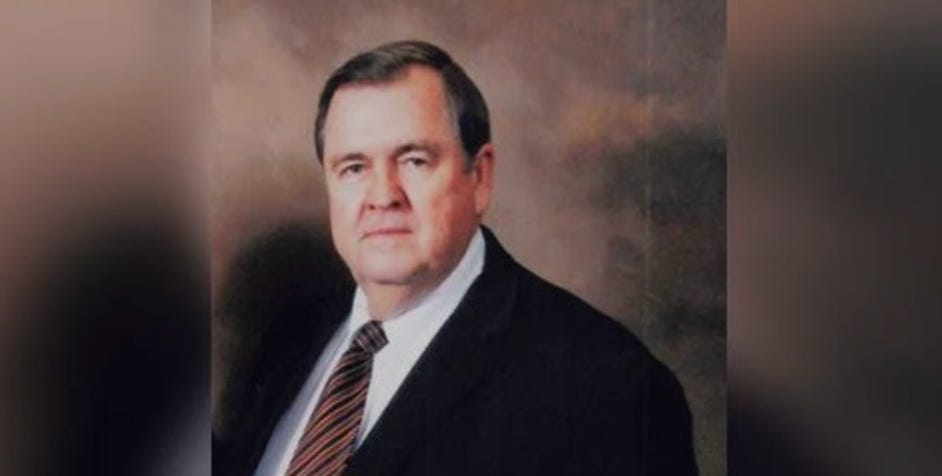As I’ve written recently, I’m in a season of farewells. That loving group of church members who invited me to be their pastor in 1992 is steadily dwindling. The latest departure was Bobby Murphy, who died last Saturday. Two days ago, I preached his funeral. As a veteran of the United States Marine Corps, Bobby received military honors at the cemetery. Two marines in dress blues played taps, solemnly folded the American flag draped on Bobby’s casket, and presented it to his widow, Syble, with the words, “Semper Fidelis.”
On February 9, 1963, Bobby made a promise to Syble. This Sunday would have been their 62nd anniversary. Before that, he made a promise to the Marines to “protect and defend the Constitution of the United States” and adhere to the core values of the Marine Corps: honor, courage, and commitment. These virtues are required of good Marines, but they’re also required of good husbands, fathers, and business leaders. The business Bobby led was the one he built: the Bobby Murphy Insurance Agency.
Insurance Policies Make Bad Religion
Providing quality insurance is an honorable vocation, a good way to love our neighbors, and fundamentally built on promise-keeping. An insurance policy is a bilateral agreement between two parties. The insured promises to pay premiums now and the insurer promises to pay claims later. It’s a basic quid pro quo; this for that. If you keep your promise, I’ll keep mine. If you pay your premiums, I promise to pay your claim. It’s mutually beneficial and everyone gets what they deserve. But insurers don’t insure everyone. To stay in business, they only insure people who can afford the premiums.
This is prudent financial planning if we’re talking about cars and boats and houses and health. But it’s a lethal way to relate to God. All the worlds’ religions offer insurance policies. If you do this, God will do that. If you pay God now, he’ll pay you later. If you are semper fidelis to him, he’ll be semper fidelis to you. If you keep your promises, he will keep his. But if you break your promises, he’s no longer obligated to keep his promises to you. Pay your premiums or the policy lapses.
How do you pay your premiums to the false god of religious insurance? Give your money to the poor, your church, your mosque, your synagogue. Give it to rescue trembling dogs from freezing and starving, or some other worthy cause. Give your time to helping people, sitting on boards, serving your community, volunteering at the homeless shelter. Follow the rules, perform the religious rituals, pay your premiums. Then God will give you forgiveness, pardon, and eternity in heaven. Be good enough.
But this is not Christianity.
Religion’s Insurance Policy is Bad News
The gospel is good news that only makes sense in view of the bad news. The bad news is that we’re not good enough and never will be. We are morally bankrupt and dead broke. Even our best works are tainted with sinful motives. “None is righteous, no, not one” (Ro. 3:10). We can’t afford the premiums.
A man once asked Jesus, “Good teacher, what must I do to inherit eternal life?” Jesus’ response is startling: “Why do you call me good? No one is good except God alone.” Then Jesus proceeds to dismantle this man’s confidence in his ability to pay his own premiums through law-keeping. None of us are good enough. That’s the bad news.
God’s Assurance Policy is Good News
Bobby wasn’t depending on an insurance policy drawn up by man. He was depending on an assurance policy drawn up by God. Not to be confused with whole-life insurance, sometimes called an assurance policy, God’s assurance policy is much different.
One dictionary defines assurance as: “a positive declaration intended to give confidence; a promise.” What is the positive declaration God makes to the believer? It’s the declaration that the believer is righteous and therefore acceptable to God. That’s the definition of justification: to be declared righteous.
…yet we know that a person is not justified by works of the law but through faith in Jesus Christ, so we also have believed in Christ Jesus, in order to be justified by faith in Christ and not by works of the law, because by works of the law no one will be justified. –Galatians 2:16
But God doesn’t justify everyone and no one deserves to be declared righteous. God only justifies those who believe in his Son (John 3:16; 1 John 5:12 ). We believers are declared righteous only because the righteousness of Christ is imputed to us while our guilt is imputed to him in “The Great Exchange” (2 Cor. 5:21; Phil. 3:9) While Jesus gets the blame for all we did wrong, we get the credit for all he did right. God justifies us for Christ’s sake.
A religious insurance policy is bilateral: If you keep your promise, I’ll keep mine. God’s assurance policy is unilateral: Though you break your promise, I won’t break mine.
A religious insurance policy says you must pay the premiums you can’t afford. God’s assurance policy says the premiums you can’t afford have been paid.
A religious insurance policy is spelled: D-O. Gods’ assurance policy is spelled: D-O-N-E.
From the cross, Jesus cried, “It is finished.” The work is done, the premiums are paid, the debt is cancelled, the penalty has been exacted, God’s wrath is spent. On the cross, Jesus did for us what we couldn’t do for ourselves, so our hearts are filled with gratitude. Therefore, we can’t help but sing:
Blessed assurance [not insurance!], Jesus is mine! Oh what a foretaste of glory divine. Heir of salvation, purchase of God. Born of his Spirit, washed in his blood. (Blessed Assurance, Fanny Crosby)
Though Satan should buffet, though trials should come. Let this blessed assurance [not insurance!] control. That Christ has regarded my helpless estate. And has shed his own blood for my soul. (It Is Well, Horatio Gates Spafford)
How Do I Get an Assurance Policy?
Over thirty years ago, Bobby told me that I was welcome to bring my (then) small children to his farm and fish in his well-stocked spring-fed pond anytime I wanted. I didn’t deserve it and he wasn’t obligated to offer it. It was a free gift. Suppose I didn’t believe him. What if I concluded, “That man is lying to me. If I show up on his property, he’ll call the police. It’s a trap.” If I hadn’t believed it, I wouldn’t have received it. But I did believe it, so I received it. Today my kids have kids, and we still have fond memories of those fishing trips to the Murphy farm.
God’s assurance policy is free because God paid the premiums sinners can’t afford. But not everyone is assured. Only those who believe will receive. Many years ago, Bobby Murphy believed Jesus. Last Saturday, Bobby received what God “promised to those who love him” (Jas. 2:5) because God is truly and eternally semper fidelis.



Steve, Excellent and very thought provoking. One of your best, so far!
What amazing grace!!! We need the gospel every day!! Thank you, Steve!!